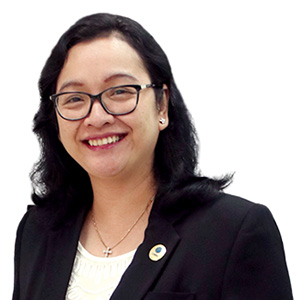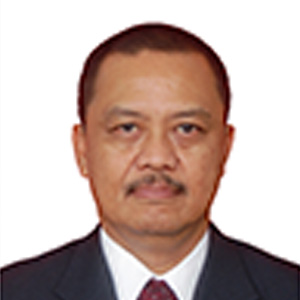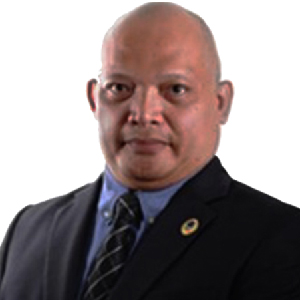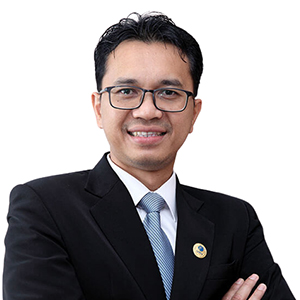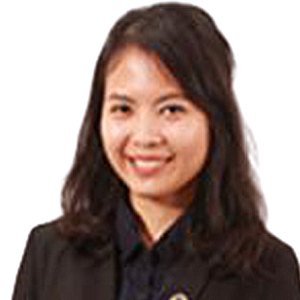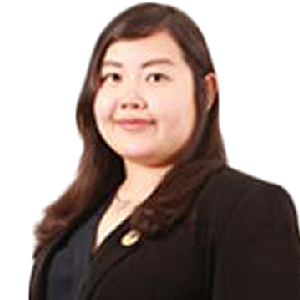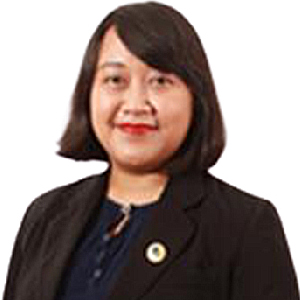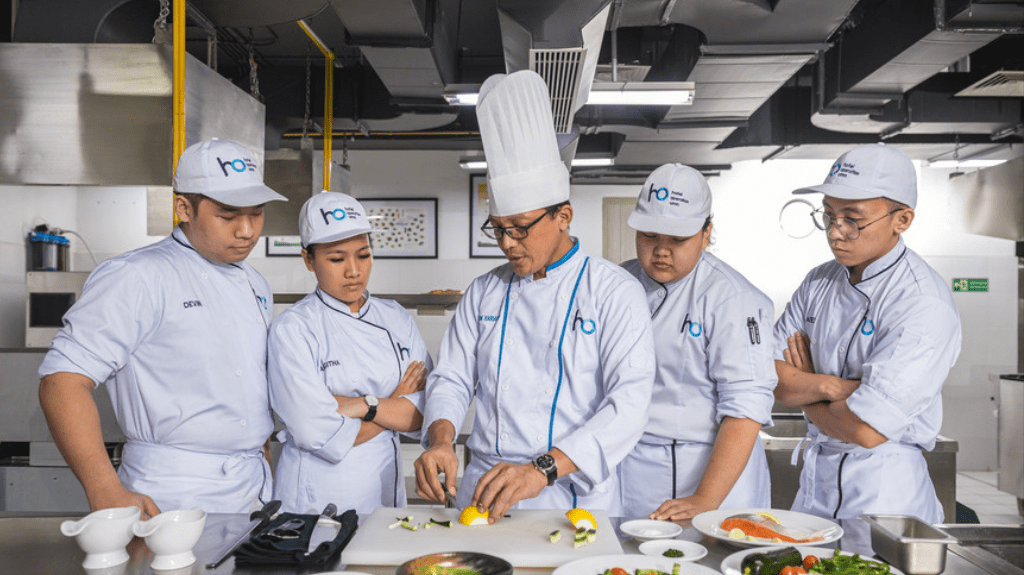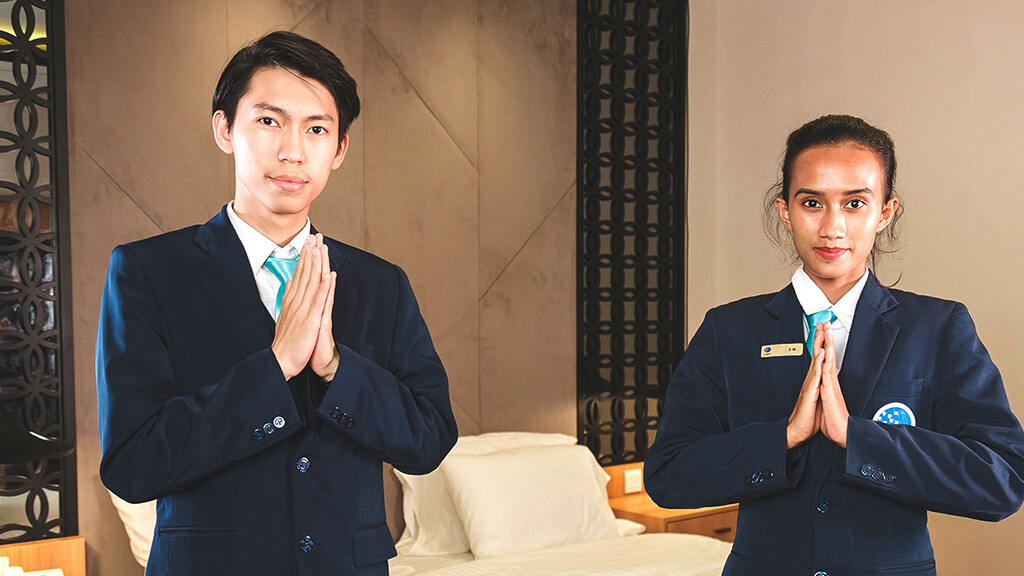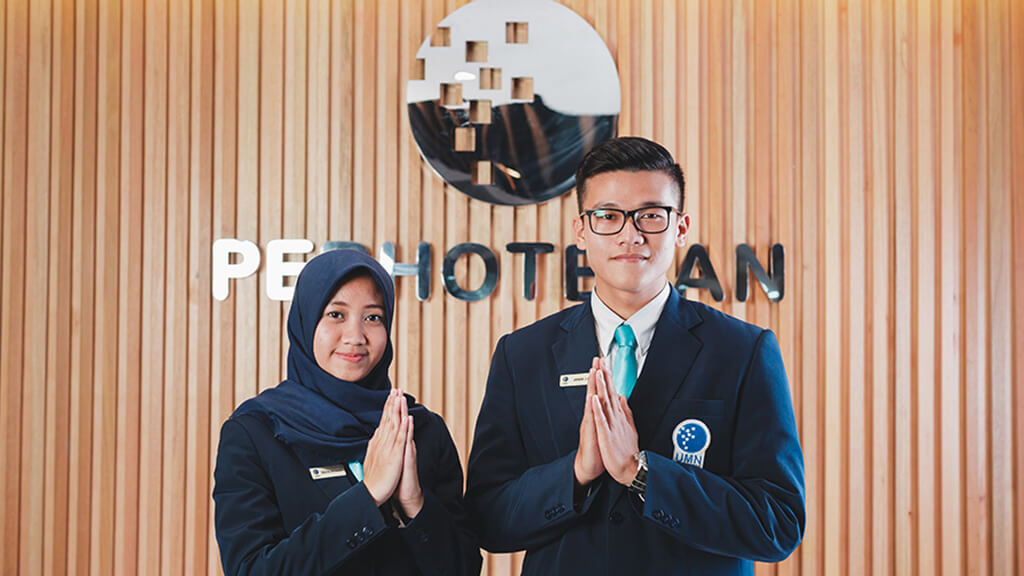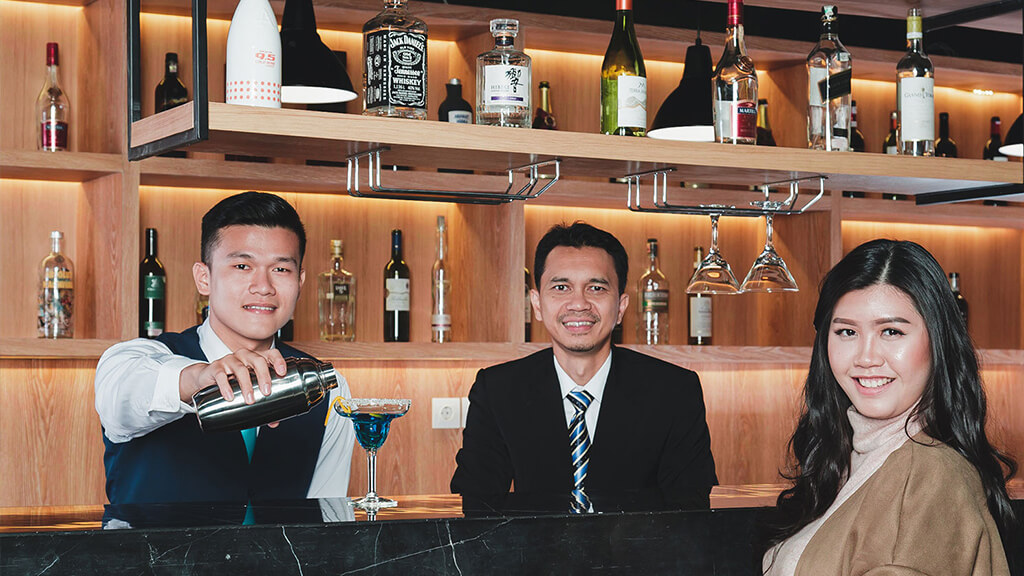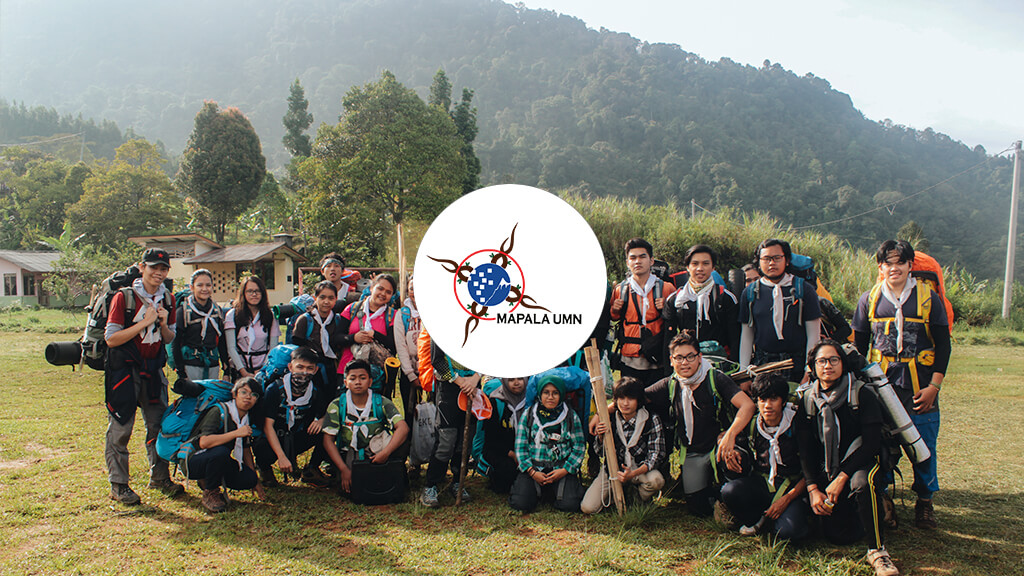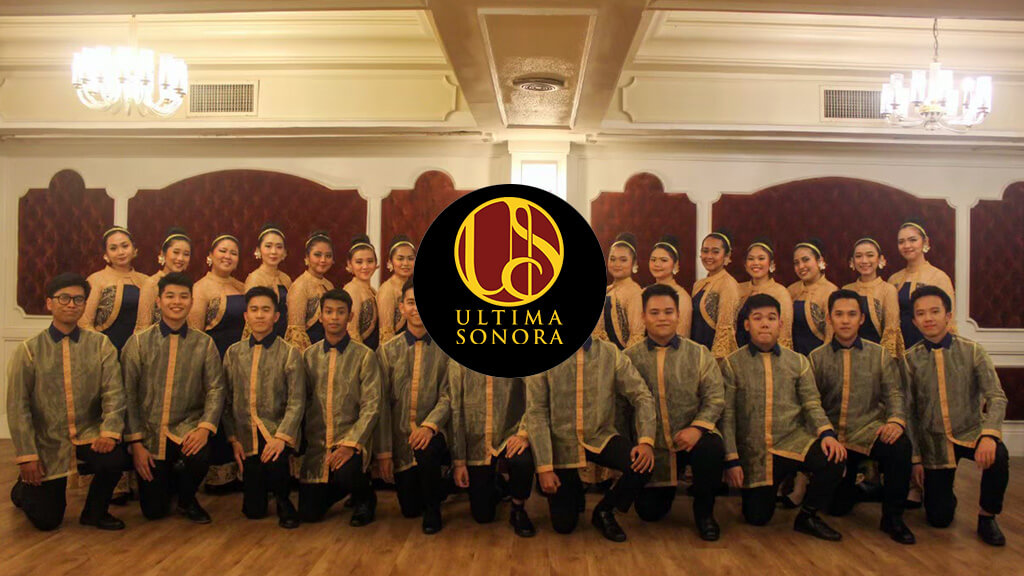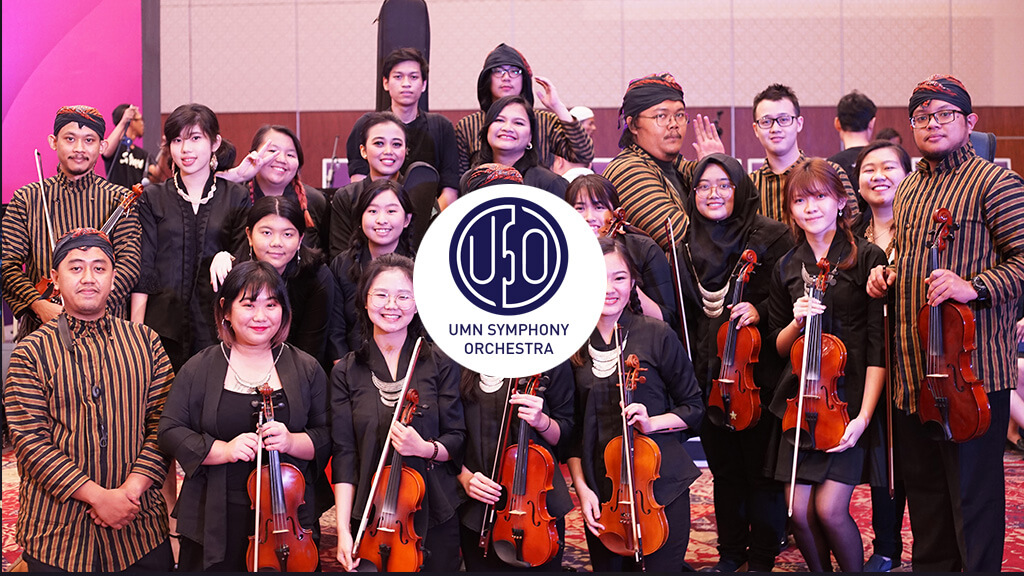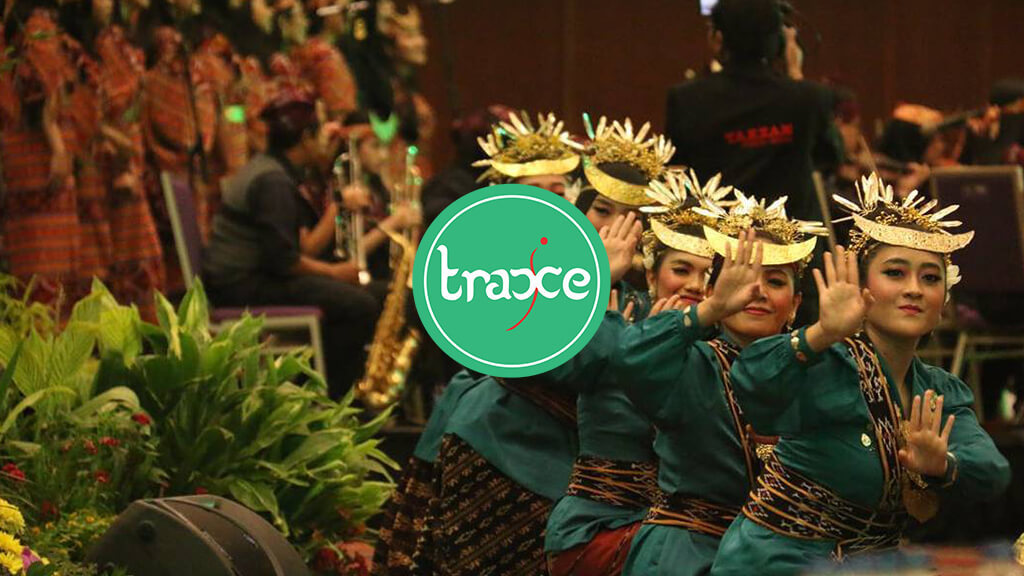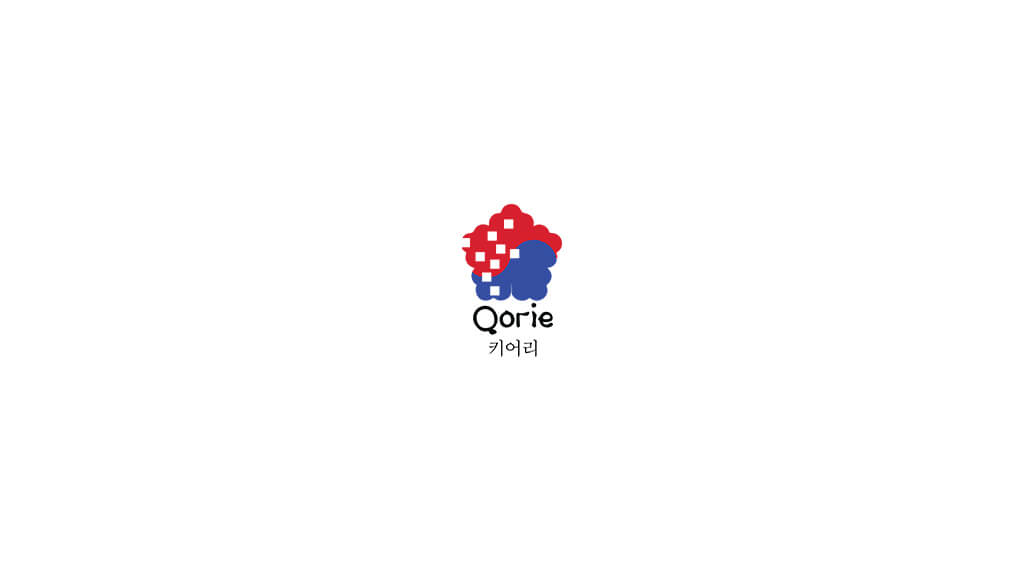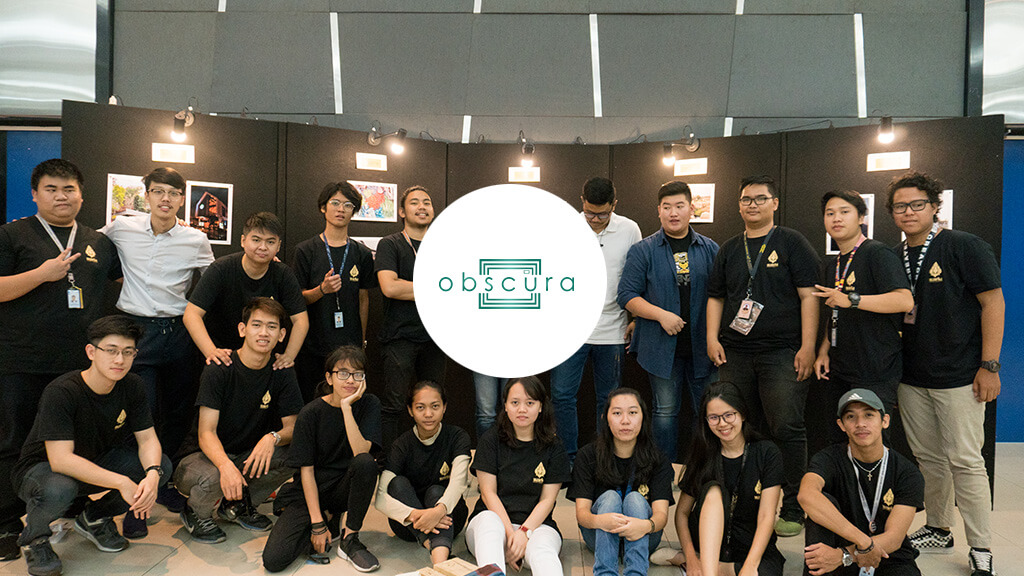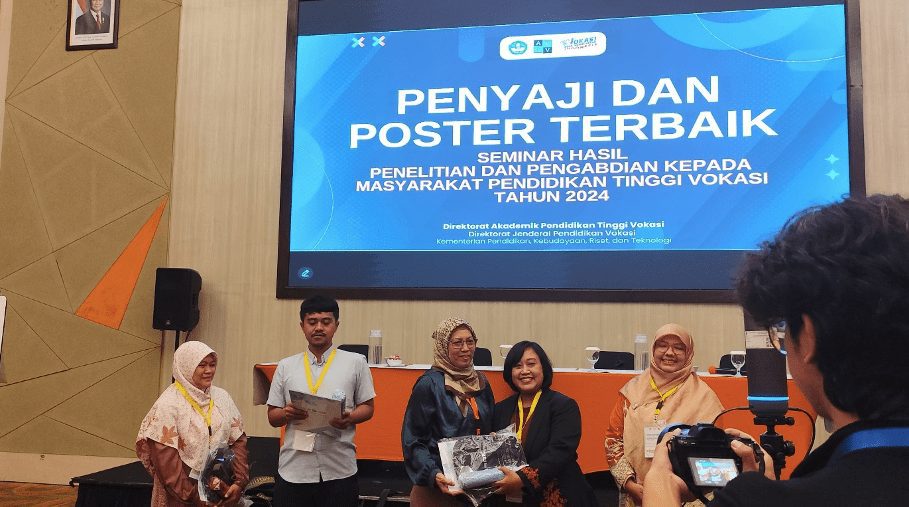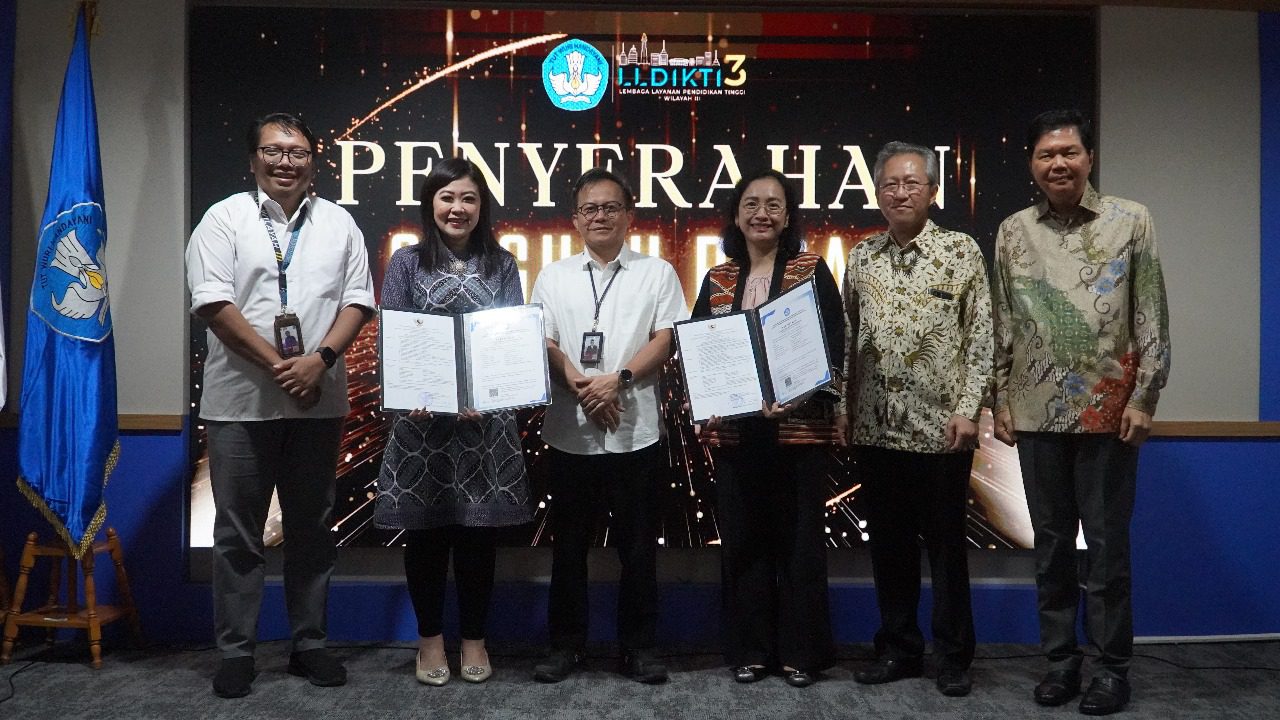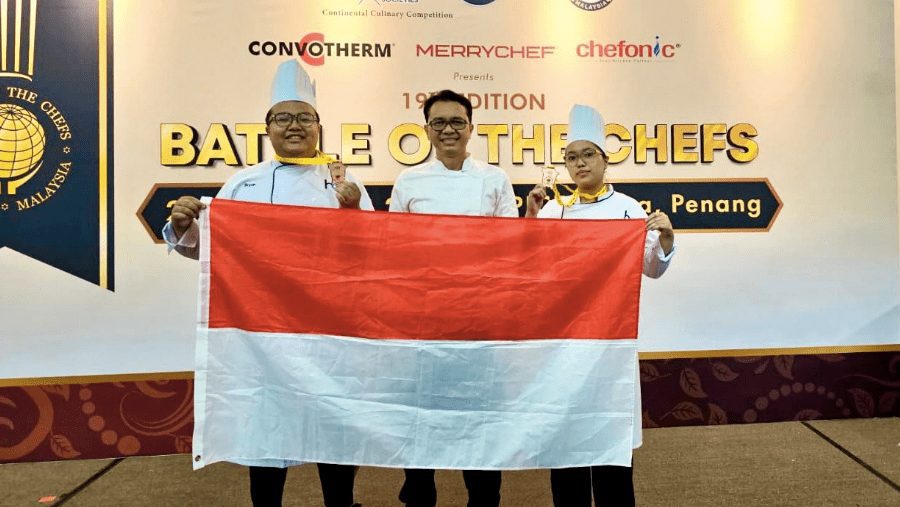Diploma Program
Department of Hotel Operations
What’s Department
of Hotel Operations?
The Hotel Diploma Program at Universitas Multimedia Nusantara (UMN) provides an excellent starting point for your career in the hospitality industry. This program combines basic theory with real-world practice to give you a thorough overview of different areas in hospitality, by providing academic education together with vocational core competency training. This carries considerable value and prestige with employers in the hospitality industry worldwide. Moreover, the Hotel Diploma Program also enables the students to obtain the necessary knowledge for their entrepreneurial ideas related to the industry.
The program for the study of electrical engineering became a vessel for students to cope with the growing growth of the industry by developing industrial automation that could help human life in the future
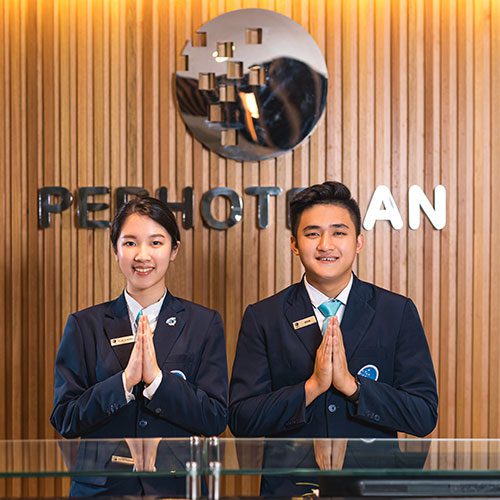
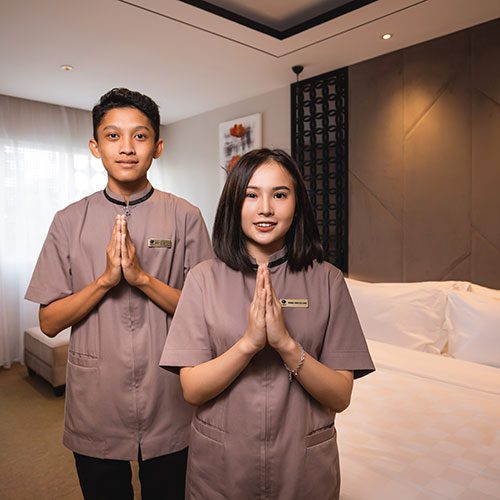
Why choose UMN’s Department of Hotel Operations?
The Hotel Diploma Program at Universitas Multimedia Nusantara (UMN) provides an excellent starting point for your career in the hospitality industry. This program combines basic theory with real-world practice to give you a thorough overview of different areas in hospitality, by providing academic education together with vocational core competency training. This carries considerable value and prestige with employers in the hospitality industry worldwide. Moreover, the Hotel Diploma Program also enables the students to obtain the necessary knowledge for their entrepreneurial ideas related to the industry.
ECTS Points Table
| ECTS Points | 174,4 points |
| Education Type | Diploma Program |
| Duration | 3 years |
| Language | English |
| Bachelor's Degree | Ahli Madya Pariwisata (A.Md.Par.) |
Description
Universitas Multimedia Nusantara (UMN) is well-known for its state-of-the art architecture and technology used in its facilities throughout the region. With its focus to pursue Information Communication Technology (ICT), the university has developed rapidly and taught more than 8000 students yearly.
Under Kompas Group, UMN is the sister company of Santika Hotel Group. Thus, the campus sees an opportunity to stimulates hotel industry through ICT. If people in the past did transactions by face-to-face meeting, internet makes everything different now. Hoteliers are also benefited in this era. There are so many shortened and simplified standards due to the use of technology.
Universitas Multimedia Nusantara then established Hotel Operations Program in 2017 with its first batch. The idea of establishing Hotel Operations Program comes from CEO of Kompas Gramedia who wants to fulfill the vocational resources for hospitality industry, so in the future Indonesia will have competent resources with expertise in hospitality industry and flexible to changes related to Information Communication Technology and Internet of Things.
In UMN, Hotel Operations Department is run under the Faculty of Business. Hotel Operations offers you basic operation and business knowledge and skills to work in a wide range of areas within multifaceted industry of hospitality. The areas include front desk operation, housekeeping operation, food and beverage management, and entrepreneurship with the support of information and communication technology.
Industry professionals and certified lecturers will lead you through Hotel Operations program to gain hands-on experience during in-campus study, supported by complete and modern laboratory for practicum classes. You will also further enhance your knowledge and skills during a 24-week work-integrated learning experience with one of the leading industry partners, which will support you in learning and developing both hard and soft skills in the hospitality industry.
Internship program is conducted on the 5th semester, with Room Division or Food and Beverage Department as the main focus. Throughout the program, you will receive relevant basic knowledge and technology-based training, completed with industry certifications, such as Food Handlers, Safety and Hygiene, and Fire and Safety Drill.
As a graduate of the Hotel Operations program, you will have unlimited career opportunities, responding to guests’ needs and providing them with exceptional service and attention to detail. You will be fully prepared to step into key roles within both the front and back of a hotel and make an impact on the guest experience, or become an entrepreneur in hospitality sector who is capable in optimizing ICT. At the end of the program, you are expected to receive a competence certification with chosen professional expertise in Room Division or F&B department that will give beneficiary to start career in hospitality industry.
Vision & Mission
Vision
Being a distinguished faculty that produces professional graduates with international insights who are competent in Management, Accounting, Hotel Operations, and Magister Management Technology, based on Information and Communication Technology (CT), have entrepreneur spirit and a noble personality.
Mission
- Organizing a qualified learning process supported by professional lecturers and up-to-date curriculum which linked and matched with industry.
- Conducting research program in ICT-based economic field that contributes to the development of management, accounting, hotel operations, and magister management technology.
- Utilizing knowledge of management, accounting, hotel operations, and magister management technology to carry out community service.
Focus Studies
Hotel Operations Program has four core subjects to be accomplished by the students:
- Front Office Operation
It compiles the knowledge and skills needed in Front Office Department, which include reservation, check-in, check-out, payment, room service, concierge, operator, and hotel administration. - Housekeeping and Laundry Operation
It compiles the knowledge and skills needed in Housekeeping Department, which includes linen, room, par stock, hygiene and sanitation, tools, equipment, and chemicals used to maintain the hotel’s facilities. - Food Production and Pastry & Bakery Production
It compiles the knowledge and skills needed in food production, which include pastry and bakery, food styling, cake decoration, cost control, purchasing, menu planning, safety and hygiene, and food display. - Food and Beverage Service Operation
It compiles the knowledge and skills needed in food and beverage service, which include bartending, introduction to aperitifs and wine, table set-up, and products upselling.
Certification
Students of Hotel Operation Program will receive Diploma certificate and 1 competence certificate in their preferred fields either in Room Division Management or Food and Beverage Division from BNSP upon study completion.
Curriculum
The Hotel Diploma Program at UMN consists of hands-on hospitality courses, including Room Division Management and Restaurant Operation, with introductory hotel management courses based on ICT. Students will learn not only about the operation of Front Office and Housekeeping management, but also about the service and production of Food and Beverage service, alongside with a variety of academic disciplines, including foreign languages. This program prepares you with the experience and practical skills to achieve various careers in the hospitality industry.
Accreditation
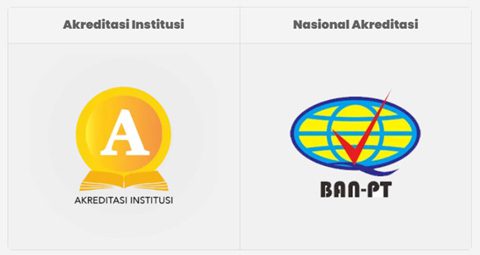
Why choose UMN’s Department of Hotel Operations?
The Hotel Diploma Program at Universitas Multimedia Nusantara (UMN) provides an excellent starting point for your career in the hospitality industry. This program combines basic theory with real-world practice to give you a thorough overview of different areas in hospitality, by providing academic education together with vocational core competency training. This carries considerable value and prestige with employers in the hospitality industry worldwide. Moreover, the Hotel Diploma Program also enables the students to obtain the necessary knowledge for their entrepreneurial ideas related to the industry.
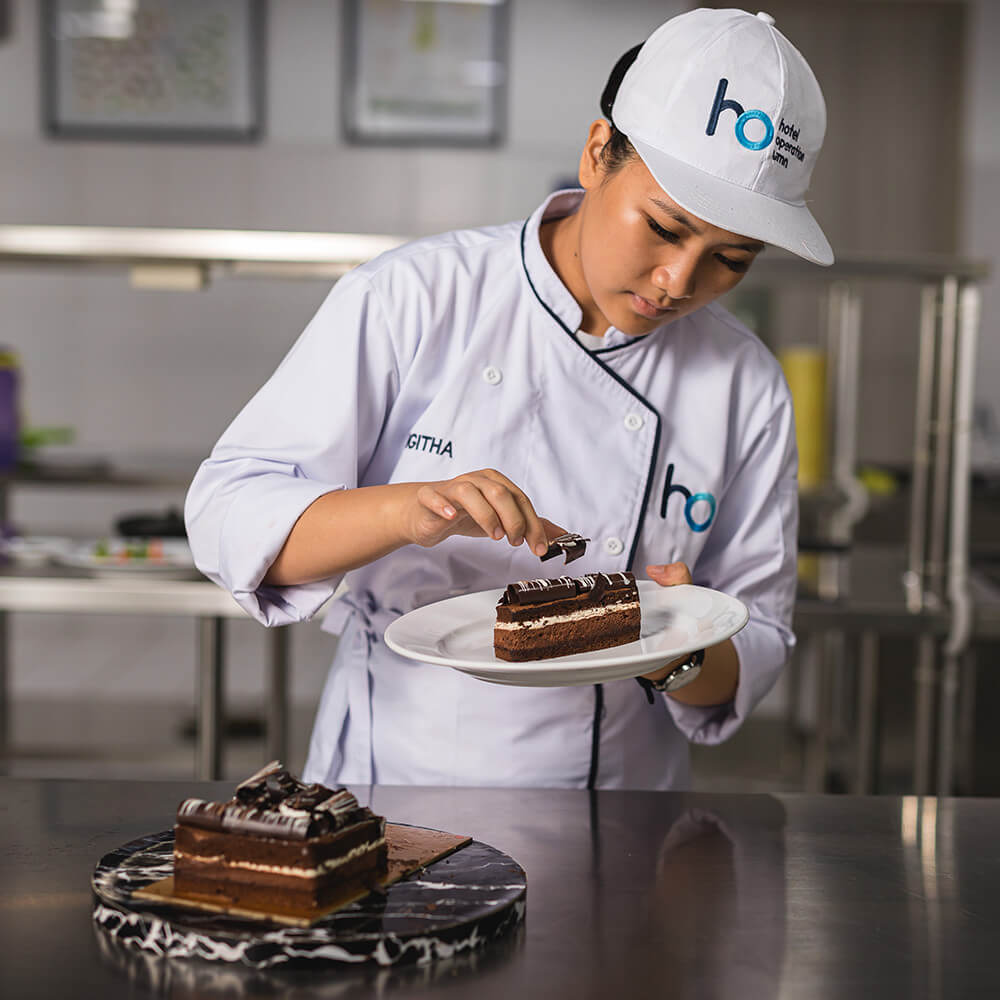
ECTS Points Table
| ECTS Points | 174,4 points |
| Education Type | Diploma Program |
| Duration | 3 years |
| Language | English |
| Bachelor's Degree | Ahli Madya Pariwisata (A.Md.Par.) |
Student Requirements
New Student Requirements
- High school/ vocational graduates, any major.
- Fluent in English (min. TOEIC score 450).
- Physically and mentally healthy
Student Scholarships
UMN scholarship program is offered to high school students in 12th grade who have academic, sports, and artistic achievements while in 11th grade. In addition, UMN also offers the program to high school/vocational school students who won medals in the National and International Science Olympics. As a form of appreciation for the dedication of teachers and employees/ staff in educating the nation's children, UMN provides scholarships in the form of a 50% reduction in fees for teachers/principals and a 30% reduction in fees for children of the employees/staff in high schools/vocational schools (both public and private) who want to continue their education at UMN.
All students of Hotel Operation Program must attend the New Student Orientation arranged by the university. After the participation, the students will receive certificate as a proof for the attendance. This certificate is one of the requirements to participate in Final Project.
Students must respect customs, ethics, and norms by:
- Maintaining a good reputation of Hotel Operation Department – Universitas Multimedia Nusantara, both inside and outside campus.
- Not drunk or under influence of illegal drugs in campus area.
- Not overly displaying affection in public (PDA).
Students must maintain cleanliness and tidiness of the campus environment by:
- Not littering campus area.
- Not doodling or making graffiti in campus facilities, furniture, and equipment.
- Not damaging campus facilities, furniture, and equipment.
- Not smoking in campus area.
- Not eating and drinking in classes.
Students must maintain courtesy and grooming by maintaining these requirements:
- Uniform
- Students must wear complete uniform when entering campus, especially in Hotel Operations Department area which include labs and office of Hotel Operations.
- For all theory classes including general subjects (MKDU), mid-test, final test, Front Office practicum classes, and other formal events: Male: plain white undergarments (not singlets), plain white formal shirts, almamater suits, uniformed long navy blue pants (not tights), black belts with small heads, long black socks, plain black loafers/pantofel (no accessories), tie, name tag. Female: plain/pastel colored undergarments, plain white formal shirt, almamater suits, navy blue knee-length skirt, black belt with small head, black stocking (not legging), plain black pantofel (no accessories) with 3 cm heels, tie, name tag. For female with long hair, hair should use hair net. *) For students with hijab, please use navy blue long skirt and plain black/navy blue hijab.
- Housekeeping practicum classes: Male: plain white undergarments (not singlets, housekeeping uniform, loose black pants (long, not skinny), name tags, black flat shoes (sneakers without lace/strap), long black socks. Female: plain white/black camisole, housekeeping tops, loose black pants (long, not skinny), name tags, black flat shoes (sneakers without lace/strap), long black socks. For female with long hair, hair should use hair net. *) For students with hijab, please use plain black hijab.
- F&B Service Operation practicum classes: Male: plain white undergarments (not singlets), plain white formal shirts, vest, uniformed long navy blue pants (not tights), black belts with small heads, long black socks, plain black loafers/pantofel (no accessories), tie, name tag. Female: plain white formal shirt, navy blue knee-length skirt, vest, black belt with small head, black stocking (not legging), plain black pantofel (no accessories) with 3 cm heels, tie, name tag. For female with long hair, hair should use hair net *) For students with hijab, please use navy blue long skirt and plain black/navy blue hijab.
- Food Production, Pastry-Bakery Production, and Food Styling practicum classes:Plain white undergarments, chef jackets, black pants, white apron, chef cap, 2 (two) towel cloth, black safety shoes, long black socks. For female, hair should be net/tied/bun.*) For students with hijab, please use a plain white hijab.
- Hair
-
- Male: hair is not painted, bangs do not exceed the eyebrows, hair length is two cm above the collar, one cm above the ears, no mustache, no beard, neat haircut, using gel/pomade/foam.
- Female: hair is not painted, neat hair style. For practicum classes, the hair is tied, bun, net for students who have long hair.
- Haircut must always be properly maintained in a neat condition.
- Shampoo at least once every couple of days and most importantly, keep natural hair color.
- Utilization of hair wig or hair extension is not allowed.
- No hair-doing when the class starts, do it before the class.
- Hair bangs must be kept above eye-brows, no hair covering eyes.
- Hair accessories must be kept simple and black in color.
- Nails
- Nail longer than the fingertips are not permitted.
- Artificial nails and nail arts are not permitted.
- Only clear or natural nail polish is permitted.
- Only clean, trimmed and well-manicured finger nails are allowed.
- Shoes, socks, and hosiery
- Simple plain black socks and hosieries.
- Plain black lace style or plain black slip on style shoes with low heels.
- Non-slip sole to avoid injury.
- No sandals, open toed or strap shoes are permitted.
- Well-polished shoes at all time.
- Belt
-
- Only plain simple black leather belts with a small head belt are allowed.
- Make up
- All students must take care of their skin care, avoid oily foods and be careful with the allergies.
- Female students should use natural and bright colored make ups, earth and natural color is highly recommended.
- Female students are not using dark lipstick or excessive make up, present a polished, professional, five-star image.
- All students must look natural, be well applied, with no garish colors.
- Jewelry
- Wedding & engagement ring is permitted.
- One additional regular ring also permitted.
- Earrings are permitted but not more than one in each ear. Any earing worn on the face (such as nose, lip, eyebrow, etc.) is not permitted during the class.
- Simple model. Plain, no stone/ diamond/ other additional material.
- Gold, silver, or its combination color only.
- Large bulky rings & rows of rings on each hand are not permitted.
- Toe rings are not permitted.
- Teeth Braces
- Only clear and silver braces are allowed.
- Eye Glasses and Contact Lenses
- Only plain simple black, brown or silver framed eyeglasses with clear lens are permitted, as well as only clear contact lenses are too.
- Tattoo and Piercing
-
- Visible body piercing and tattoo are not permitted. Face or tongue or other visible body piercings must be removed while students are in campus area.
PASS stands for Professional Attitude Scoring System. It is used to grade the students’ attitude in campus environment. The grading will be based on three aspects which include academic and behavioral skills, professional grooming, and community skills.
All students have zero score at the beginning of each course. Throughout the week, the lectures will fill in the PASS grading in the UNION application. Students will have minimum score 0 (zero) and maximum score 100 (one hundred).
In every Hotel Operation course, PASS will take 20% of the total final score.
An academic advisor will be assigned for every class. Academic advisor will hold at least three meetings every semester to review about the academic issues. The meetings are commonly set up at the beginning of the semester, before the mid-test, and before the final test. Students may consult about their academic problems after making an appointment with the advisor. For a deeper issue, advisor may refer the student to consult in University’s appointed psychologist/counsellor.
Hotel Operations Program annual events are:
| Odd semester | a. Executive sharing (RD, F&B)
b. Beauty class c. Hotel Visit &Table manner d. IP Presentation e. Final Project Briefing f. Final Project Exhibition g. Campus Visit h. Community Service i. Competition |
| Even semester | a. Executive Sharing (RD, F&B)
b. IP Workshop c. IP seminar d. Industrial Visit e. Competence Test I&II f. Hotel Festival g. Community Service h. Competition |
Students from semester one can join the student body. The period of each batch is one year, but students can apply again in the second year. Students who want to join can apply during the opening registration which is commonly available in August or September annually. The process of recruiting will include certain steps of test, including interview and presentation. Students are suggested to participate actively in student body for their SKKM points.
Internship in Hotel Operation Program is mandatory. Students must conduct the internship once which is in semester five. Students can choose job from Room Division department or from Food and Beverage Department. The procedures and requirements for Industrial Placement are stated in Internship Guidebook which will be provided and explained in Internship briefing.
The credit of Final project course in Hotel Operation Program will be taken at semester six. The final project will be an individual project which combine the knowledge and skills in Hotel Operation reflected in the form of product exhibition and business proposal. The procedures and requirement for the final project is stated in Final Project Guidebook.
The labs in Hotel Operations aims to:
- Provide facilities of various relevant courses in Hotel Operation Department.
- Organize training and skills development in hotel operation by utilizing matching technology with industry to enhance qualified vocational skills. Practicum laboratories in Hotel Operations Program are located in Tower D, 3rd floor. The laboratories are commonly used for university activities, regular practicum classes, course assignments, campus media activities, student affairs activities, or other campus official activities. These labs include:
-
Lab Functions Front Office Provides facilities for Front Office Operation 1 (HO111) and Front Office Operation 2 (HO211). Housekeeping Provides facilities for Housekeeping Operation 1 (HO121) and Housekeeping Operation 2 (HO222). Laundry Provides facilities for Housekeeping Operation 2 (HO222). Prasanti Restaurant & Bar Provides facilities for Food and Beverage Service Operation 1 (HO431) and Food and Beverage Service Operation 2 (HO531). Kitchen Provides facilities for Food Production 1 (HO441) and Food Production 2 (HO541). Pastry & Bakery Provides facilities for Pastry and Bakery Operation (HO442) and Food Styling (HO542). Computer Provides facilities for Front Office Operation 1 (HO111), Front Office Operation 2 (HO211), online mid-tests and final exams.
Below are rules and regulation that must be complied when using labs in Hotel Operation area:
- Users
The users of Hotel Operation laboratories are the entire UMN students and staff whose permission has been approved by Department Head of Hotel Operation Program.
- Procedures
No students are allowed to enter any facilities, such as labs and Lecturer’s Office without permission. If there is no lecturer or admin staff available, it is strictly prohibited for students to enter the Lecturer’s Office. To use the labs or classes non-academically in Hotel Operation Department area, students or staff should fill in the required form which can be obtained in Building Management office or Hotel Operation office. This form must be signed by event coordinators, head of Building Management, and head department of Hotel Operation. The form has three sheets. One should be hold by the event organizer, one to the building management, and the other to Hotel Operation Department. zIt is illegal to use the labs or classes (and any facilities included inside) in Hotel Operation area without any approval evidence. For those caught using the area without approval evidence, they will be reported to DEM (Dewan Etik Mahasiswa/ Student Ethics Board) and sanctions will be given after the hearing.
- Operating hours
All facilities in Hotel Operation Department can be functioned well from 08.00 to 17.00. Before 08.00 and after 17.00, no air condition functions and all facilities in Hotel Operation Department Area will be closed for public. - Obligations
- Lab users must read and comply the rules and regulation posted in every lab.
- Lab users must take care of the hygiene and cleanliness of the area.
- Lab users must be well-behaved and be careful when using the labs and the facilities.
- Lab users are required to return all facilities used to their original location, tidy and clean them up after use.
- Lab users are prohibited from smoking, eating, or drinking in Hotel Operation Lab.
- Lab users are to place bags, gadgets, and other luggage in the lockers provided.
- All students of Hotel Operation are required to be well-groomed and wear precise uniform when using the labs.
- During the practicum test, students are permitted to bring their own equipment and ingredients with their own risks and responsibilities.
- Only those who are willing to comply with these rules are permitted to use UMN Hotel Operation laboratories.
The curriculum of Hotel Operations program has its own philosophy, sociology, psychology, history, and juridical aspects. All these aspects refer to National Standard Permendikbud No. 3 2020, Learning Outcomes from Hildiktipari Association, SN Dikti Article 9-2. KKNI Level 5 (Perpres RI no.8 2012), the vision of mission of UMN, Faculty of Business, and Hotel Operations Program, as well as the FGD results with hotel industry.
Graduate professional profile is the graduate characters expected to have after 2 years graduating until 3-5 years working in the industry.
- Become a competent professional in providing excellent service to guests in front office operations, housekeeping, food and beverage service, and/or food production that is nationally and internationally competitive.
- Become an individual who is cultured and has noble character in accordance with the university credo and industry needs.
- Become an individual who is entrepreneurial, creative and innovative in realizing enthusiasm and opening up entrepreneurial opportunities in the technology-based hospitality sector.
- Become a professional who is able to communicate in Indonesian and English assertively and is able to work as a team.
- Become a professional who is able to optimize the use of the latest technology in the working environment or in independent business activities.
|
No. |
ELO Code | Keywords |
Description |
| 1. | CPL-A | Hotel Operations Knowledge | Graduates have an understanding of theoretical concepts in a hotel operation, especially in the field of front office, housekeeping, food and beverage services and food production, cakes and bakery production, according to procedures that is applied in the industry/workplace and sanitation, hygiene, safety and health standards in hotel operations. |
| 2. | CPL-B | Hotel Operations Professional Skills | Graduates have the competence in procedural skills of a hotel operation, especially in the field of front office, housekeeping, food and beverage services and food production, cakes and bakery production, according to procedures that is applied in the industry/workplace and sanitation, hygiene, safety and health standards to fulfil the standard customer satisfaction in a work simulation. |
| 3. | CPL-C | Basic Hotel Knowledge | Graduates have an understanding of theoretical concepts and basic competencies in general regarding tourism, hospitality, marketing, finance, HR and environmental health. |
| 4. | CPL-D | Entrepreneurship | Graduates have tenacity and are able to think creatively (out of the box) in creating business opportunities by carrying out the stages of trend analysis and identifying market potential with simple standard analysis tools for a business proposal in the hospitality sector. |
| 5. | CPL-E | Technology Literacy | Graduates are able to understand the concept of using electronic devices and technology and their use in managing hotel operations and or independent business activities. |
| 6. | CPL-F | Lifelong Learning | Graduates have the ability to collaborate, take initiative, adapt, think critically, show leadership qualities and internalize the enthusiasm for developing self-competencies. |
| 7. | CPL-G | Communication Skills | Graduates have the ability to communicate in an assertive, persuasive, effective, and professional manner that is used when working in Indonesian or English, orally and in writing. |
| 8. | CPL – H | Human Literacy | Graduates are able to demonstrate integrity and professionalism in accordance with the Global Code of Ethic of Tourism as well as Indonesian personalities who uphold religious values, Pancasila, morals, norms and ethics both in the workplace and in the social environment. |
| 9. | CPL-A | Hotel Operations Knowledge | Graduates have an understanding of theoretical concepts in a hotel operation, especially in the field of front office, housekeeping, food and beverage services and food production, cakes and bakery production, according to procedures that is applied in the industry/workplace and sanitation, hygiene, safety and health standards in hotel operations. |
Based on the curriculum, the career prospect involved solely in operational will only offer jobs as:
- Front Office Supervisor
- Floor Supervisor
- Housekeeping Supervisor
- Room Inspector
- Laundry Supervisor
- Food & Beverages Supervisor
- Waiter/s
- Bartender
- Cook
- Demi chef de partie
However, along with the growth of technology and internet, Hotel Operations Program believes the curriculum also open wider career path according to the main competencies, such as:
|
Front Office |
Housekeeping | F&B Service |
| Receptionist
Front Desk Agent GRO Operator Concierge Bell boy Secretary Trainer/Instructor Consultant |
Housekeeper
Room Boy Butler Laundry Trainer/Instructor Consultant
|
Barista Bartender Sommelier Trainer/Instructor Consultant
|
|
F&B Production |
Managerial |
|
Celebrity chef Patissier Food Stylist Food Photographer Cuisine journalist Food Reviewer Gourmet Trainer/Instructor Consultant |
Entrepreneur Purchasing staff Procurement staff Marketing staff Sales staff PR staff Finance Staff Human Resource Staff Consultant |
Semester 1
| Num. | Course Code | Course Name | Credit | Pre-requisite Course Code | Compulsory/ Elective | SDG | |
| Lect. | Lab | ||||||
| 1 | UM163 | Civics | 2 | – | Compulsory | 4 | |
| 2 | UM142 | Bahasa Indonesia | 2 | – | Compulsory | 4 | |
| 3 | HO151 | Professional English 1 | 2 | – | Compulsory | 4 | |
| 4 | HO111 | Front Office Operation 1 | 2 | 2 | – | Compulsory | 4 |
| 5 | HO121 | Housekeeping Operation 1 | 2 | 2 | – | Compulsory | 4 |
| 6 | HO158 | International Hospitality Industry | 2 | – | Compulsory | 4 | |
| 7 | HO456 | Hygiene, Safety, and Sanitation | 2 | – | Compulsory | 4, 3, 6 | |
| 8 | HO159 | Introduction to Multimedia Technology | 1 | 1 | – | Compulsory | 4 |
| TOTAL CREDIT SEMESTER 1 | 20 | ||||||
Semester 2
| Num. | Course Code | Course Name | Credit | Pre-requisite Course Code | Compulsory/ Elective | SDG | |
| Lect. | Lab | ||||||
| 1 | UM 142 | Pancasila | 2 | 0 | – | Compulsory | 4 |
| 2 | UM 152 | Religion | 2 | 0 | – | Compulsory | 4 |
| 3 | HO 441 | Food Production 1 | 2 | 2 | – | Compulsory | 4, 12 |
| 4 | HO 431 | F&B Service Operation 1 | 2 | 2 | – | Compulsory | 4, 12 |
| 5 | HO 442 | Pastry and Bakery Production | 2 | 2 | – | Compulsory | 4, 12 |
| 6 | HO257 | Principles of Management | 2 | 0 | – | Compulsory | 4 |
| 7 | HO 252 | Principles of Hotel Accounting | 2 | 0 | – | Compulsory | 4 |
| TOTAL CREDIT SEMESTER 2 | 20 | ||||||
Semester 3
| Num. | Course Code | Course Name | Credit | Pre-requisite Course Code | Compulsory/ Elective | SDG | |
| Lect. | Lab | ||||||
| 1 | HO 154 | Consumer Behavior | 2 | 0 | – | Compulsory | 4 |
| 2 | HO551 | Business Communication | 2 | 0 | – | Compulsory | 4 |
| 3 | HO 451 | Professional English 2 | 2 | 0 | – | Compulsory | 4 |
| 4 | HO 211 | Front Office Operation 2 | 2 | 2 | – | Compulsory | 4 |
| 5 | HO 222 | Housekeeping Operation 2 | 2 | 2 | – | Compulsory | 4 |
| 6 | HO 454 | Purchasing and Procurement | 2 | 0 | – | Compulsory | 4 |
| 7 | HO352 | Service Marketing | 2 | 0 | – | Compulsory | 4 |
| 8 | HO 543 | Menu Planning | 2 | 0 | – | Compulsory | 4 |
| 9 | HO 455 | Cost Control | 2 | 0 | – | Compulsory | 4 |
| TOTAL CREDIT SEMESTER 3 | 22 | ||||||
Semester 4
| Num. | Course Code | Course Name | Credit | Pre-requisite Course Code | Compulsory/ Elective | SDG | |
| Lect. | Lab | ||||||
| 1 | HO 256 | Report Writing | 2 | 0 | – | Compulsory | 4 |
| 2 | HO 541 | Food Production 2 | 2 | 2 | – | Compulsory | 4, 12 |
| 3 | HO 531 | F&B Service Operation 2 | 2 | 2 | – | Compulsory | 4, 12 |
| 4 | HO 542 | Food Styling | 1 | 2 | – | Compulsory | 4, 12 |
| 5 | HO 457 | Entrepreneurship | 2 | 2 | – | Compulsory | 4, 9 |
| 6 | HO 458 | Hospitality E-Commerce | 2 | 0 | – | Compulsory | 4 |
| 7 | HO 555 | Ethical Business Management | 2 | 0 | – | Compulsory | 4 |
| TOTAL CREDIT SEMESTER 4 | 21 | ||||||
Semester 5
| Num. | Course Code | Course Name | Credit | Pre-requisite Course Code | Compulsory/ Elective | SDG | |
| Lect. | Lab | ||||||
| 1 | HO561 | Professional Business Ethics | 0 | 3 | HO111, HO 121, HO 441, HO 431, HO 442, HO 211, HO 222, HO 541, HO 531, HO 542 | Compulsory | 8 |
| 2 | HO562 | Industry Experience | 0 | 7 | HO111, HO 121, HO 441, HO 431, HO 442, HO 211, HO 222, HO 541, HO 531, HO 542 | Compulsory | 8 |
| 3 | HO563 | Industry Model Validation | 0 | 7 | HO111, HO 121, HO 441, HO 431, HO 442, HO 211, HO 222, HO 541, HO 531, HO 542 | Compulsory | 8 |
| 4 | HO564 | Evaluation and Reporting | 0 | 3 | HO111, HO 121, HO 441, HO 431, HO 442, HO 211, HO 222, HO 541, HO 531, HO 542 | Compulsory | 8 |
| TOTAL CREDIT SEMESTER 5 | 20 | ||||||
Semester 6
| Num. | Course Code | Course Name | Credit | Pre-requisite Course Code | Compulsory/ Elective | SDG | |
| Lect. | Lab | ||||||
| 1 | HO652 | Final Project | 6 | 0 | HO 457, HO 561, HO 562, HO 563, HO 564 | Compulsory | 1, 2, 3, 8, 9, 10 |
| TOTAL CREDIT SEMESTER 6 | 6 | ||||||
- UCSI Malaysia
- Taylor’s University Malaysia
- Notre Dame Marbel University, Philippines
- CITIS Kompas Gramedia
- Modena Indonesia
- Archipelago Internasional
- Kawan Lama Sejahtera
- Santika Indonesia
- Century Park Hotel Jakarta
- Hotel Ciputra Jakarta
- Le Meridien Jakarta
- Parador Hotels & Resorts (PT Paramount Management International)
- Pullman Jakarta Central Park
- Ritz Carlton Kuningan Jakarta
- Santika Premiere ICE BSD
- Novotel Tangerang
- Oakwood Hotel & Residence Surabaya
- Renaissance Bali
- The Westin Jakarta
- Episode Hotel Gading Serpong
- Intercontinental Jakarta Pondok Indah
- Sultan Hotel & Residence Jakarta
- Notre Dame of Marble University
- Universiti Teknologi MARA, Malaysia
- Universiti Teknologi MARA, Malaysia
- Universiti Teknologi MARA, Malaysia
- Centre for Research and Innovation in Tourism (CRiT)
- PT Indotama Sentosa Lestari
- Reine des Mers
- Indonesian Chef Association
- Gramedia
- Kelompok Sadar Wisata Kampung Wisata Keranggan (Ekowisata Keranggan)
- Dinas Kesehatan Kota Tangerang Selatan
- Desa Serdang Wetan
- Desa Lengkong Kulon
To support the learning process, umn provided a complete and sophisticated college facility, according to industrial standards. Through the existence of the facility, students have been invited to be close to the industrial world since sitting in college and to have competence that matches the needs of the industry. That way, it will make it easier for umn students to find jobs, even before graduation.
Extracurricular Student Activities
In order to help students explore and develop their non-academic potentials, UMN also provides a variety of extra-curricular activities for students which is locally called UKM, Student Activity Unit.

SEE OTHER
UMN’S STUDENT ACTIVITIES
Rekapitulasi Penelitian Internal
Rekapitulasi Data PKM
Rekapitulasi Data Inovasi
Achievement Lecturer
Academic Achievement Students
Non-Academic Achievement Std
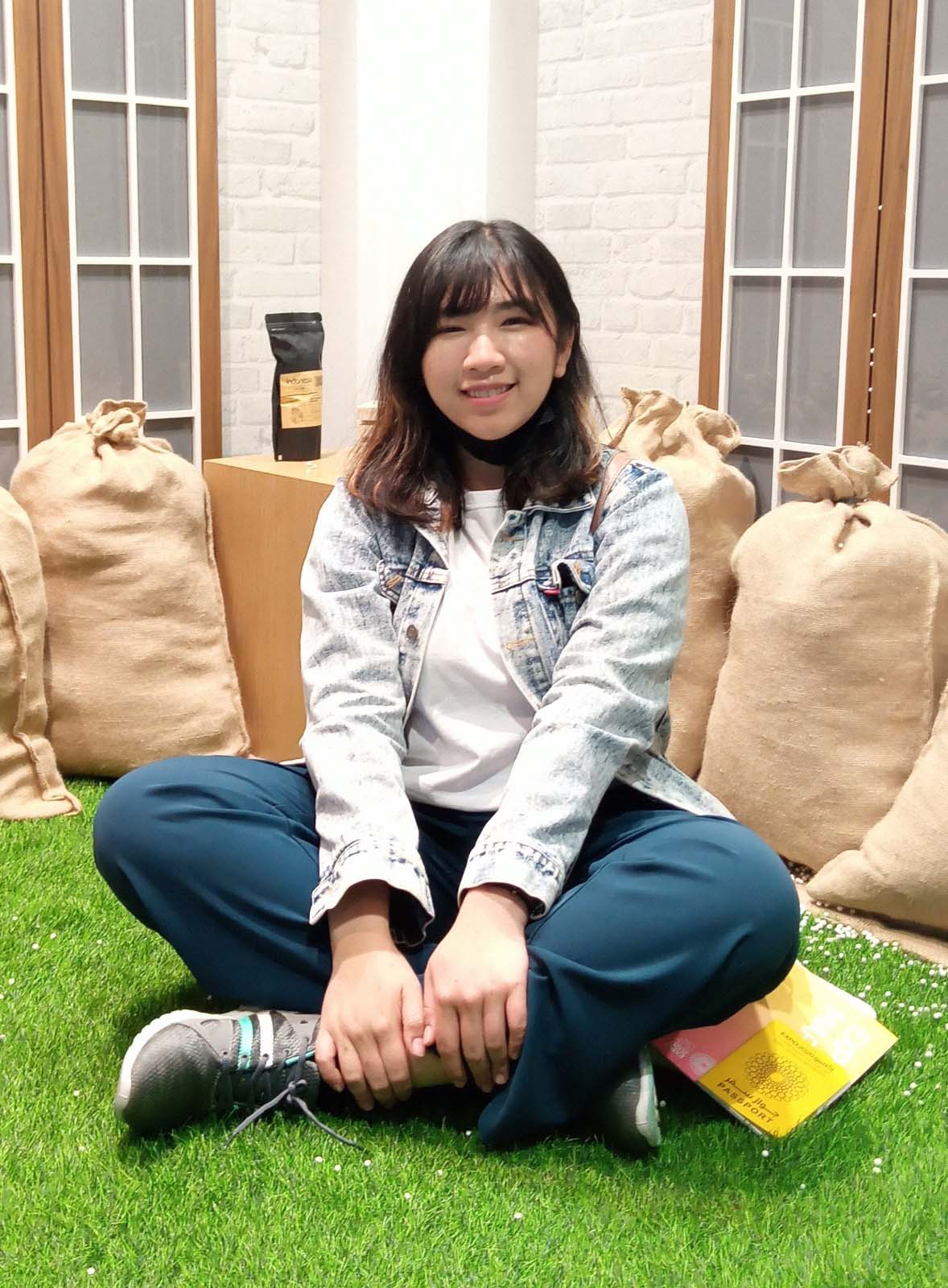
"During my studies at UMN, I gained extensive experience in both theory and practice. As someone who prefers hands-on learning, the practical classes were very helpful in providing the basic knowledge of the hospitality industry and preparing students for internship programs. In addition to operational skills, the D3 Hotel Operations program at UMN also equips students with managerial competencies, such as leadership and cost control."
Jessica Priscilia S.
Hotel Operations 2018 | Commis 1 at Hilton Abu Dhabi Yas Island, Abu Dhabi, UEA
Department of
Hotel Operations
The Hotel Diploma Program at UMN consists of hands-on hospitality courses, including Room Division Management and Restaurant Operation, with introductory hotel management courses based on ICT. Students will learn not only about the operation of Front Office and Housekeeping management, but also about the service and production of Food and Beverage service, alongside with a variety of academic disciplines, including foreign languages.

